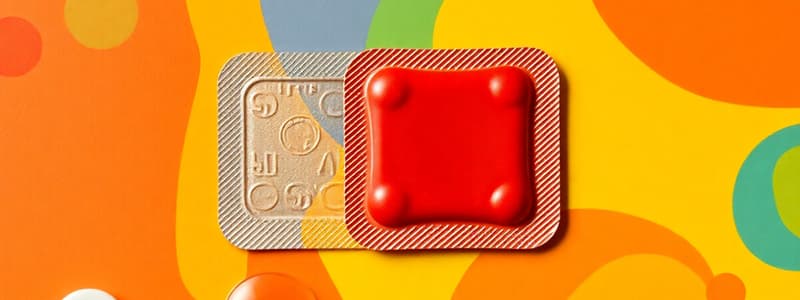Podcast
Questions and Answers
What is the primary mechanism through which dry-powder inhalers (DPIs) generate aerosols?
What is the primary mechanism through which dry-powder inhalers (DPIs) generate aerosols?
- By a patient's inhalation force (correct)
- By using a propellant
- By chemical reaction
- Through mechanical vibration
Which of the following is NOT an advantage of dry-powder inhalers compared to metered-dose inhalers (MDIs)?
Which of the following is NOT an advantage of dry-powder inhalers compared to metered-dose inhalers (MDIs)?
- Requires no inhalation technique (correct)
- Doses are counted
- Protected against humidity
- Doses are homogeneous
What characteristic is true for the Genuair dry-powder inhaler?
What characteristic is true for the Genuair dry-powder inhaler?
- It can be used in humid conditions
- It is designed for pediatric use
- It is activated by inhalation (correct)
- It lacks a dose indicator
Which type of insulin is designed for controlling blood glucose levels between meals and overnight?
Which type of insulin is designed for controlling blood glucose levels between meals and overnight?
What is a notable feature of the Ellipta dry-powder inhaler?
What is a notable feature of the Ellipta dry-powder inhaler?
In insulin therapy, what is the function of bolus insulin?
In insulin therapy, what is the function of bolus insulin?
Which of the following dry-powder inhalers is characterized by being multidosed and activated by inhalation?
Which of the following dry-powder inhalers is characterized by being multidosed and activated by inhalation?
Which statement accurately describes a feature of auto-injection devices?
Which statement accurately describes a feature of auto-injection devices?
What is the primary purpose of a spacer when used with MDIs?
What is the primary purpose of a spacer when used with MDIs?
What factors influence the effectiveness of MDI delivery?
What factors influence the effectiveness of MDI delivery?
Which group of individuals is most likely to benefit from using a spacer?
Which group of individuals is most likely to benefit from using a spacer?
How does the administration time of MDI typically compare to other inhalation techniques?
How does the administration time of MDI typically compare to other inhalation techniques?
What is a potential side effect of using MDIs without appropriate techniques or devices?
What is a potential side effect of using MDIs without appropriate techniques or devices?
What role does proper training play in the effective use of MDIs?
What role does proper training play in the effective use of MDIs?
What is the primary mechanism by which MDIs deliver medication?
What is the primary mechanism by which MDIs deliver medication?
For whom are masks, when used with MDIs, especially beneficial?
For whom are masks, when used with MDIs, especially beneficial?
What is a critical function of the membrane in a transdermal patch?
What is a critical function of the membrane in a transdermal patch?
Which of the following statements about the adhesive layer in a transdermal patch is true?
Which of the following statements about the adhesive layer in a transdermal patch is true?
How often should the nicotine transdermal patch be changed?
How often should the nicotine transdermal patch be changed?
What is the purpose of the liner in a transdermal patch?
What is the purpose of the liner in a transdermal patch?
Which of the following drugs is NOT typically administered via a transdermal patch?
Which of the following drugs is NOT typically administered via a transdermal patch?
Which area is NOT recommended for applying a transdermal patch?
Which area is NOT recommended for applying a transdermal patch?
What characteristic is essential for transdermal patches regarding drug delivery?
What characteristic is essential for transdermal patches regarding drug delivery?
What is the role of permeation enhancers in a transdermal patch?
What is the role of permeation enhancers in a transdermal patch?
Which characteristics make a skin area suitable for patch application?
Which characteristics make a skin area suitable for patch application?
What is an important step to ensure safe handling of used patches?
What is an important step to ensure safe handling of used patches?
Which of the following best describes the action of the levonorgestrel-releasing IUD?
Which of the following best describes the action of the levonorgestrel-releasing IUD?
Which characteristic of inhaler devices is critical for effective pulmonary drug delivery?
Which characteristic of inhaler devices is critical for effective pulmonary drug delivery?
What is the primary advantage of using the inhalation route for drug delivery?
What is the primary advantage of using the inhalation route for drug delivery?
Which type of inhaler is specifically designed for administering medication in mist form?
Which type of inhaler is specifically designed for administering medication in mist form?
How long should a patient wait before reapplying a patch to the same skin area?
How long should a patient wait before reapplying a patch to the same skin area?
What type of device is NUVARING classified as?
What type of device is NUVARING classified as?
Flashcards
Transdermal Patch
Transdermal Patch
A specialized dosage form that delivers medication through the skin and into the bloodstream, providing a controlled and constant release of the drug.
Backing (Transdermal Patch)
Backing (Transdermal Patch)
A layer that protects the patch from the environment and prevents components from escaping. It's impenetrable to the patch's contents.
Membrane (Transdermal Patch)
Membrane (Transdermal Patch)
A layer that controls the rate at which the drug is released from the patch. It acts as a gatekeeper, ensuring a steady supply of medicine.
Adhesive (Transdermal Patch)
Adhesive (Transdermal Patch)
Signup and view all the flashcards
Matrix (Transdermal Patch)
Matrix (Transdermal Patch)
Signup and view all the flashcards
Liner (Transdermal Patch)
Liner (Transdermal Patch)
Signup and view all the flashcards
Drugs Administered in Transdermal Patches
Drugs Administered in Transdermal Patches
Signup and view all the flashcards
Transdermal Patch Change Frequency
Transdermal Patch Change Frequency
Signup and view all the flashcards
Patch application guidelines
Patch application guidelines
Signup and view all the flashcards
Levonorgestrel-releasing IUD
Levonorgestrel-releasing IUD
Signup and view all the flashcards
Nuvaring
Nuvaring
Signup and view all the flashcards
Inhaled Medication
Inhaled Medication
Signup and view all the flashcards
Aerosol
Aerosol
Signup and view all the flashcards
Pressurized Metered-dose Inhalers (pMDIs)
Pressurized Metered-dose Inhalers (pMDIs)
Signup and view all the flashcards
Dry-powder inhalers (DPIs)
Dry-powder inhalers (DPIs)
Signup and view all the flashcards
Molecule size and pulmonary drug delivery
Molecule size and pulmonary drug delivery
Signup and view all the flashcards
Metered-Dose Inhaler (MDI)
Metered-Dose Inhaler (MDI)
Signup and view all the flashcards
Spacer
Spacer
Signup and view all the flashcards
Who should use a spacer?
Who should use a spacer?
Signup and view all the flashcards
MDI and Spacer with a Mask
MDI and Spacer with a Mask
Signup and view all the flashcards
Inspiratory Flow Rate
Inspiratory Flow Rate
Signup and view all the flashcards
Breathing Pattern
Breathing Pattern
Signup and view all the flashcards
Hand-Mouth Coordination
Hand-Mouth Coordination
Signup and view all the flashcards
Breath Holding
Breath Holding
Signup and view all the flashcards
Dry Powder Inhaler (DPI)
Dry Powder Inhaler (DPI)
Signup and view all the flashcards
DPI Usage
DPI Usage
Signup and view all the flashcards
Genuair
Genuair
Signup and view all the flashcards
Diskus or Accuhaler
Diskus or Accuhaler
Signup and view all the flashcards
Insulin Therapy
Insulin Therapy
Signup and view all the flashcards
Basal Insulin
Basal Insulin
Signup and view all the flashcards
Bolus Insulin
Bolus Insulin
Signup and view all the flashcards
Auto-Injection Devices
Auto-Injection Devices
Signup and view all the flashcards
Study Notes
Specialized Pharmaceutical Forms
- Devices are specialized dosage forms, where the desired administration and targeting of the drug is achieved with the help of the packaging container.
Transdermal Patch
- A transdermal patch is a medicated adhesive placed on the skin to deliver a specific dose of medication into the bloodstream.
- Important characteristics include controlled and constant drug release into the patient.
- Components include backing, membrane, adhesive, and liner.
- Backing protects the patch from the environment and is impermeable.
- Membrane controls the release of the drug.
- Adhesive binds the components and contains permeation enhancers to promote skin permeability.
- Liner protects the patch during storage and is peeled off before use.
- Examples of drugs administered via transdermal patches include nitroglycerin, estradiol, nicotine, hyoscine, and fentanyl.
- Frequency of patch change varies depending on the drug.
Intrauterine Device (IUD)
- Levonorgestrel-releasing IUDs prevent fertilization by impairing sperm viability and interfering with sperm movement.
- NUVARING is a plastic ring device that releases hormones locally to avoid pregnancies.
Inhaled Formulations
- Inhaled formulations deliver drug particles or solutions in an aerosolized form to the lungs.
- Aerosols are colloidal dispersions of liquids or solids in gases.
- Oral aerosol inhalers are used to treat asthma and other respiratory issues.
Oral Aerosol Inhalers
- Types of inhalers include small volume nebulizers (SVNs), pressurized metered-dose inhalers (pMDIs), and dry-powder inhalers (DPIs).
- Choice of inhaler depends on the drug, formulation, desired delivery site in the lungs, and the patient characteristics.
- Advantages of inhalation route include targeted organ delivery, small doses, quick onset, and limited side effects.
Small-volume Nebulizers (SVNs)
- SVNs administer medication as a mist inhaled into the lungs.
- They use oxygen, compressed air, or ultrasonic power to break down solutions and suspensions into aerosol droplets.
- Each administration typically takes 5-10 minutes.
Metered-Dose Inhalers (MDIs)
- MDIs are pressurized dosage forms that deliver medication to the lungs by creating an aerosol.
- They deliver a measured amount of drug.
- MDIs can deliver quick-relief or everyday controller medications for asthma.
- MDI delivery efficiency depends on the patient's inspiratory flow rate, breathing pattern, and hand-mouth coordination.
- Spacers are often used to improve drug delivery and reduce side effects (aphonia, oral thrush) by minimizing drug particle deposition on the upper airway (e.g., oropharynx) and increasing lung deposition.
- Spacers are particularly helpful for children, patients with impairments or unconsciousness, or anyone having difficulty coordinating hand-mouth breathing.
- MDIs can be used with spacers or masks, which are useful for patients who cannot reliably inhale through their mouth.
- Masks come in various sizes and are suitable for all ages, even children and adults with cognitive issues.
Dry-powder Inhalers (DPIs)
- DPIs produce aerosols through inhalation force rather than through a propellant.
- Compared to MDIs, DPIs are often easier to use
- Rapid inhaling rate is required which is not suitable in patients like pediatric or elderly patients.
- Generally, DPIs are easier to use.
- Typical types of DPIs are Diskus® or Accuhaler™, Turbuhaler®, Handihaler®, Breezhaler®, Genuair®, and Ellipta®.
Auto-injection Devices
- Auto-injection devices allow patients or non-medical personnel to self-administer medications.
- Medications administered this route include insulins, glucagon, heparin, methotrexate, and adrenaline.
Parenterals: Insulins
- Insulins are administered via injection.
- Methods for insulin administration include insulin syringes (subcutaneous tissue), insulin pens, and insulin pumps.
Insulin Therapy
- Aim is to mimic normal pancreas insulin secretion through basal (continuously secreted) and bolus (in response to glucose levels) insulin administrations.
- Basal insulin is provided by intermediate or long-acting formulations (e.g. NPH, Lente, Ultralente, Lantus, Glargine, Levemir, Detemir).
- Bolus insulin is provided by rapid or short-acting insulins (e.g. Humalog, Novolog, Apidra, Regular).
Insulin Administration
- Insulin can be administered safely via insulin syringes or pens.
- Insulin pumps deliver insulin continuously or in bolus doses.
Insulin Names
- Insulin names are described by pharmaceutical brand names and device names.
- The specific types include rapid-acting, short-acting, intermediate-acting, and long-acting insulins.
Studying That Suits You
Use AI to generate personalized quizzes and flashcards to suit your learning preferences.




